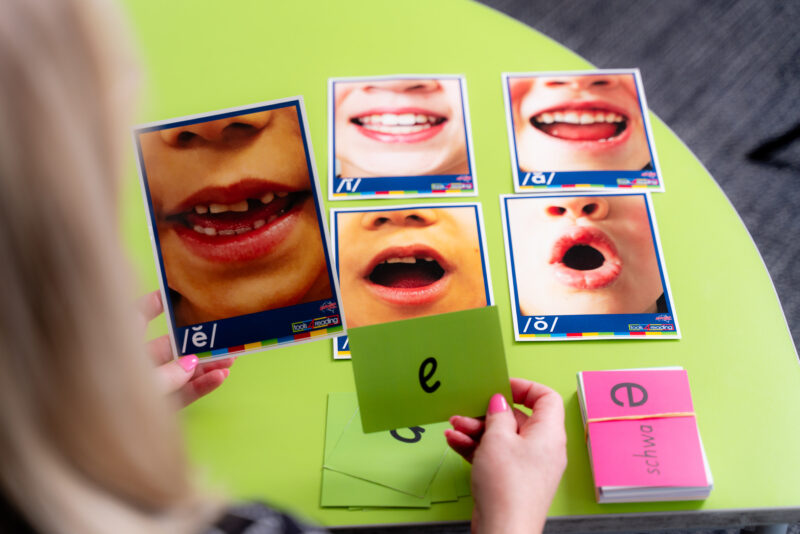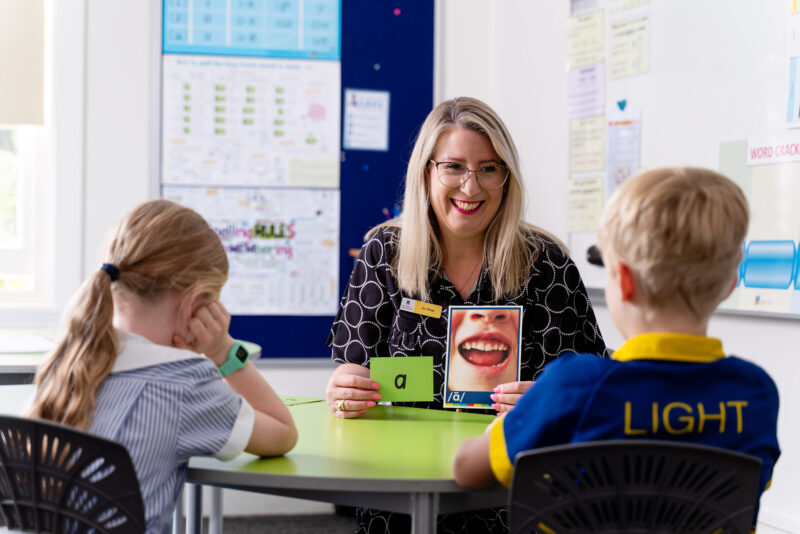Inclusive education for all students
At St Peter’s Woodlands, developing confident and resilient learners is central to our core values. Inclusive Education at SPW is just that – an educational experience that is inclusive of the diverse learners that make up our student community. Our philosophy is Inclusive Education is about welcoming and celebrating diversity and every child having equitable opportunities to participate, learn, grow, and thrive.
Our Inclusive Education Team comprises of Head of Inclusive Education, Tina Day, School Psychologist, Stephanie Eustice, Instructional Coach, Jo Hirst, as well as Maria Beatty (Literacy Intervention) and Nicki Pitt (Numeracy Intervention). Providing day-to-day support in the classroom is the team of highly skilled and experienced Education Support Officers (ESO). This team strives to create an environment where every learner feels welcome, valued, and able to participate, to flourish and reach their full potential.
“We want every child to have the opportunity to be successful and shine wherever their strengths and interests lie,” SPW Head of Inclusive Education, Tina Day said. “At SPW, inclusion is a vital part of our school culture and is to be celebrated.”
Before students start schooling at SPW, the Inclusive Education Team seeks to build a holistic picture of their skills, abilities and needs to develop individualised learning plans and provide the appropriate support and learning opportunities. “The transition to school is a significant milestone in any child’s life. So identifying how to best set each child up for success in their school career will hopefully make that transition as positive as possible”.
Through a rigorous regime of monitoring student learning progress from Early Learning through to Year 6, we can identify potential difficulties and provide appropriate intervention, through a Multi-tiered System of Support (MTSS). Class teachers play a critical role in ensuring that information is delivered in a way that supports all students to engage with the learning. The Explicit Direct Instruction model used in classrooms supports teachers to break down concepts into smaller, sequential steps. The “I do, We do, You do” approach takes the guesswork out of learning key literacy and numeracy skills. “This approach is easily adapted to any learning situation – at home or at school.”

The Inclusive Education Team play an essential role in the gathering of data to monitor each student’s progress in literacy and numeracy across the year. In consultation with the teaching staff, students who may benefit from targeted support are identified. Class teachers and the Inclusive Education team then work with families to plan how to best develop the skills requiring support. This support (intervention) may include programs delivered in-class by classroom teachers or ESOs, out of class programs delivered by our intervention specialists, or perhaps referral to one of the many Allied Health professionals who provide therapy support on-site at SPW. The Inclusive Education team have developed positive working relationships with a number of allied health providers (e.g. Speech Pathologists, Psychologists, Occupational Therapists, Behavioural Therapists, and Social Workers). Tina Day oversees the co-ordination of these services being provided onsite at SPW. This includes everything from making sure that each visiting professional has the relevant documentation needed to meet SPW’s commitment to child safety, to identifying spaces for these professionals to use, to supporting with identifying appropriate session times that will not clash with key learning times in the classroom. Having a collaborative ‘team around the child’ is truly invaluable.

We understand the investment made by families in seeking further information and/or support from allied health professionals. Consequently, when a report from a professional is shared with school staff, Tina ensures that the information is summarised for teaching staff and the recommendations are included in the individual learning plan for that student. Additionally, the Inclusive Education Team work collaboratively with Enrichment staff to develop individual learning plans for students requiring extension in their learning.
While one of the goals of intervention support is to ‘close the gap’ for students who are struggling, we also have a large focus on teaching students the skills that will allow them to become independent, empowered lifelong learners. “We are not about trying to change who a child is – we aim to support them to the point where they understand themselves as learners, empowering them to become their own advocates for what works best for them,” Tina said. “Often, learning challenges can be with individuals for life, our job is to teach them practical skills such as using technology and work arounds, in order for them to continue to be successful, independent learners when they move from SPW onto secondary school and then into the workplace.”
Inclusive Education at SPW has a very strong commitment to supporting the ‘whole’ student with a strong focus on student wellbeing. Tina, Steph and Jo work in close collaboration to identify barriers to learning to ensure students receive appropriate and timely support around wellbeing, social and emotional development. Steph is often found visiting classes. Relationships are the key to wellbeing so spending time in the classroom gives her a very unique insight into what students need to thrive socially and emotionally – it is very rare to see Steph without a crowd of children surrounding her!
![]()
In addition to providing targeted support around students’ social and emotional needs, Inclusive Education also provides proactive support with the Hub, a lunchtime club for students who are looking for a supportive and fun place to hang out and escape the demands of the school yard. Students can drop in or be referred by their class teacher. Children may come for a day, a week or become a regular ‘Hub Club Member’ – the Hub is available to all students when and if they need it. Students are supported to find an activity that they enjoy. Through play, students can then build relationships with their peers. An amazing example of this is a current Legoscape that is under construction in the Hub. Lead by one of the Year 5 students, students from Year 1, 2, 3, 4 and 5 have all contributed to this amazing scene!
“When we talk about Inclusive Education, we must also consider children who may need additional support around social interactions and friendship issues, who may need a quieter space at lunchtime to hang out with friends, who may be feeling a little bit lost or lonely. Sometimes children just need a ‘soft place’ to go to.”
![]()
Tina believes that it is this multi-faceted approach of the Inclusive Education team and school community that makes the SPW so successful. Each person needs to know that they belong at SPW.
“Being inclusive isn’t just one thing – it is so many things intertwined with what we all do on a daily basis. It is the culture and visible practice of letting every individual know that they are a valued member of our community.”
Article by Tina Day and Steph Eustice.